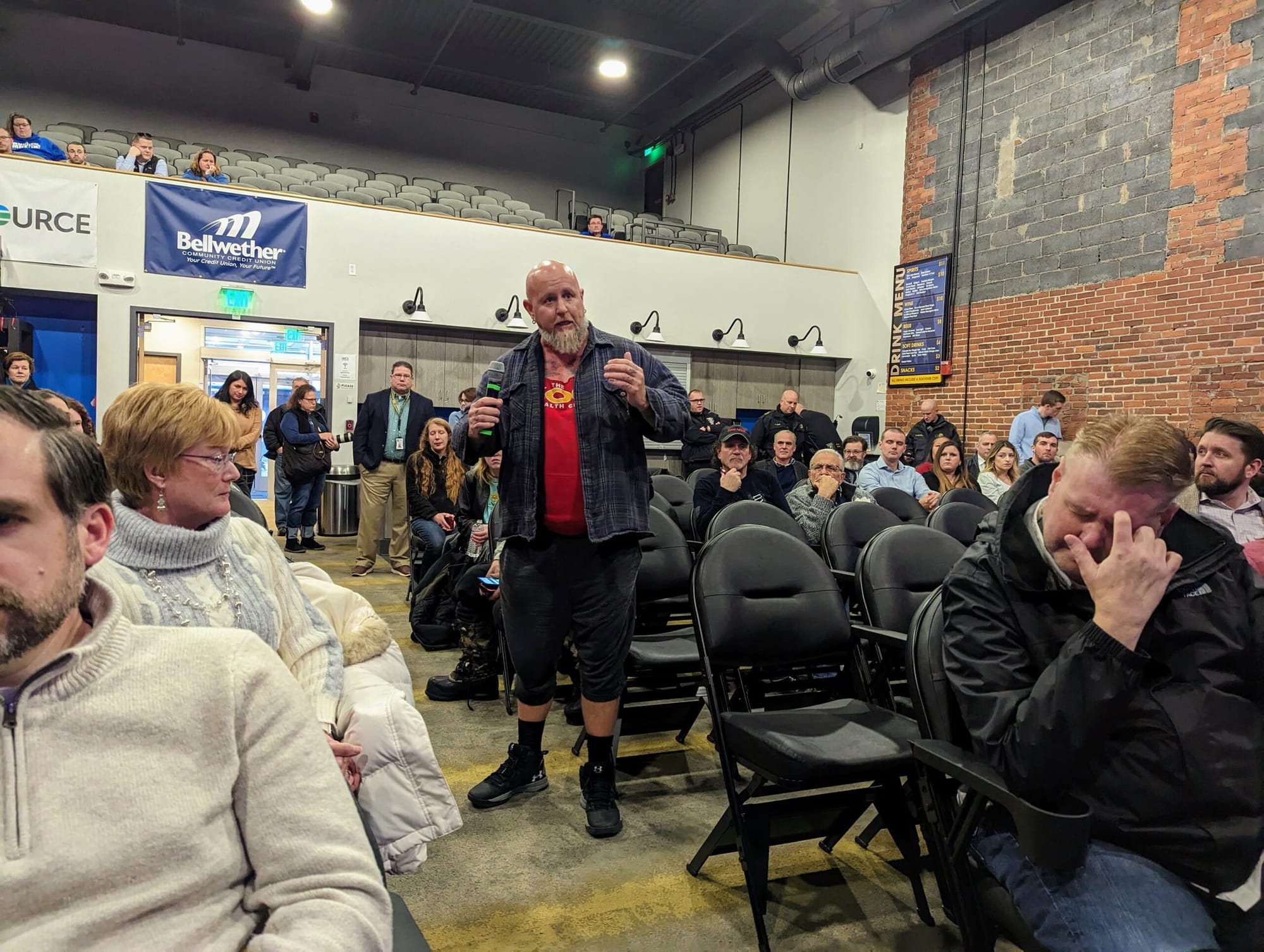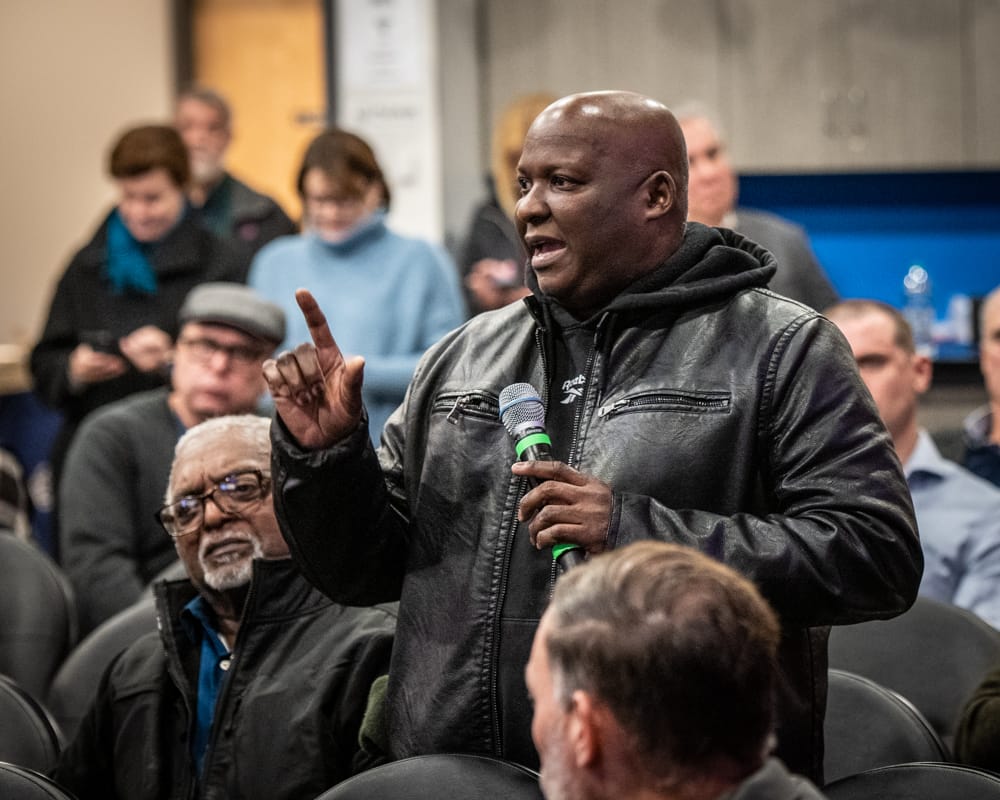With a full shelter and the clock ticking on homeless encampment eviction, business owners ask: ‘Where will they go?
The meeting, organized by the city’s Economic Development office, was billed as a “sit down” with Adrienne Beloin, Director of Homeless Initiatives, to talk about the “impacts of homelessness” on downtown businesses and properties.


MANCHESTER, NH –About 100 people filed into the Rex Theatre Monday afternoon, mostly business owners but also some community leaders, police officers, firefighters, city officials and homeless folks were counted in the mix.
The meeting, organized by the city’s Economic Development office, was billed as a “sit down” with Adrienne Beloin, Director of Homeless Initiatives, to talk about the “impacts of homelessness” on downtown businesses and properties.
The meeting was timely in that less than a week ago several downtown business owners spoke publicly at the Board of Mayor and Aldermen meeting, asking elected officials to take action. Since then, the city has activated its Emergency Operations Center to focus on the need for resources for the homeless, and has opened the West Side Cashin Senior Center as an overnight emergency shelter.
And most notably, the city on Monday morning posted “vacate premises” signs around the Families in Transition Shelter, notifying those who have been sleeping on the sidewalk for the past few months that they have to go by Jan. 17.

Jim Normand was the first of several downtown business owners to ask a question.
He mentioned it’s not unusual on a Saturday to find a pup tent in his parking lot, or a grocery cart in his gazebo. “I’m not complaining,” he said before referencing the city’s “vacate’ order in framing his question to Beloin.
“Where are they going? Are we offering them a location? Gill Stadium? Big parking lot someplace? Where are we inviting them to go when they leave? Does the city have a plan for that?” Normand asked.
Beloin responded, “That’s the number-one question that keeps me up at night. It’s the kind of thing we’re rapidly trying to problem-solve for,” she said, adding that the cots at the Cashin center are not a long-term solution. She also acknowledged that having people vacate the property outside the shelter would simply force them to move to another location. “I know that even with an emergency shelter, we can get all the beds in the world and it might not be enough to get the folks you’re seeing into a location. We have a deep understanding as to why it’s difficult for some folks to accept an emergency shelter bed.”
There are alternative solutions that haven’t yet been tried or made available to Manchester’s homeless, Beloin said. Working alongside Andrew Warner, the city’s new Director of Overdose Prevention, she is hoping to make strides that will actually solve the problem rather than scatter them to another location or doorway.
She said department heads are now working every day through the Emergency Operations Center to explore immediate options.
“So where are we going to have a place for a lot of people who can’t be indoors?”, came Normand’s follow-up question.
“We’re a team focused on putting together anything we can. We got the Cashin center up and running over the weekend and now we’re looking for any available properties we can move on tomorrow. Some of them are finished and we can do something right away. Others need some work or some changing up,” Beloin said.

Other considerations are the need for storage and other barriers.
“It’s a little tricky to relax the rules to the point where you don’t have any because that would take a lot of round-the-clock staff to make things safe and comfortable for the neighborhood and the folks inside,” she said. “So I don’t have an answer but we’re working on it and we’re hopeful we’ll have something up and running in the next few weeks”
Another audience member who didn’t give his name suggested we “get rid of all the drug dealers and allow the homeless to live in the houses currently occupied by drug dealers.” Warner said that was probably a better question for the police department to field.
Michael Thomas identified himself as an ex-addict and someone who’d spent two years in prison. He said since his release he’s working on establishing a non-profit that he hopes can build homes for the homeless. His suggestion was to consider purchasing the daycare located across the street from the encampment and turn it into a shelter.
“It can be done if we give people the chance,” Thomas said, who criticized the amount of money the state has allocated for housing projects that will take up to two years to complete.
“It’s insane to me,” he said, noting that there are contractors who could retrofit an empty property much cheaper and faster.
As for the issue of the need for bathrooms, Thomas said something as simple as putting a porta-potty in the general area is a no-brainer.

Beloin said public bathrooms were a topic she was interested in hearing more from audience members about. From a “trauma-informed perspective” she said it’s understood that if a person’s basic needs aren’t being met, like having a place to relieve themselves comfortably, then there’s no way to make progress in getting that person in a place where they want to talk about their future.
John Cronin identified himself as someone who has lived in the city 40 years. He wanted to know what the homeless census was, and what percentage of people accessing the city’s services were from Manchester. “I’ve heard it’s as little as 20-25 percent,” Cronin said. He said he’s heard people get released from city hospitals into the street with no place to go. He also commented on the “proliferation” of sober homes, noting that with the transformation soon of the former Goodwin Funeral Home on Chestnut Street into a halfway house, it was important for city officials to “tighten up” ordinances.
Then Cronin talked about his hometown of Quincy, Mass., which he said was “similar” to Manchester some 10 years ago with drugs, panhandling and homelessness.
“You should go look at it now. Beautiful. Talked to the mayor there he’s willing to introduce you to the departments and tell you what they’re doing,” Cronin said. The shelter population gets wrap-around services and they are building a multi-resource shelter across from the old shelter, with vocational services, mental health services and some beds, he said. He also pointed to Bergen County, NJ, as an example the city should look at for inspiration and guidance. That community is one of a few that has been recognized for having achieved “functional zero” homelessness.
Patrick Garrity said as a former State Representative, the city needs to organize its Hillsborough County delegation of lawmakers and ask them to assist with getting money released from the county. “They have lots of money. They received millions and millions of dollars from COVID,” that they’re sitting on, Garrity said.
“This is an emergency,” he said. “We need to go to a delegation meeting and say this is a crisis and we need funding immediately to house these people on an emergency basis. I have compassion for these people, but the businesses are suffering. We’re not going to be in business much longer.”

Following the meeting Norri Oberlander of North End Properties, who has been working with other landlords in the community to raise money and devise a non-governmental solution, said she understands fully the need for bathroom facilities, but also understands that it would require 24/7 monitoring to be safe. She also said adding a container to collect hypodermic needles, known as a sharps waste container, might work to reduce the number of needles tossed aside, but it would require thought.
“It would have to be in a place that makes sense, like outside the Health Department or fire station, or hospital – someplace where it will be safe. You can’t just have them all over the place,” Oberlander said.
She also said that while she agreed “one-hundred percent” with fellow business owner Ed Baroody, who emphasized the need for compassion, Oberlander said his location means he’s once removed from the eye of the storm.
“He’s not down here at ground zero,” she said. “It’s one thing to have compassion but from where he is, he doesn’t know the risks we face every day, or the fear for our employees, our tenants, and our businesses,” Oberlander said.
In concluding the meeting, Warner said what’s happening right now in Manchester is a “real turning point,” and people are starting to realize you can’t keep doing the same thing and expect a resolution. The time for finger-pointing is over. “We’re all in this together,” he said. “I”m really excited about the future of Manchester.
Adding to that, Beloin said those who attended the meeting and signed in will stay in the loop.
“I really appreciate getting to know you guys and your pain points and I see it as my job to figure out ways around it. I can promise you that in the world of homelessness and substance abuse disorder it takes innovative solutions that are non-traditional, things we haven’t even tried yet,” Beloin said.




